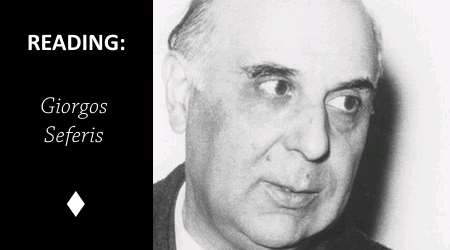Giorgos Seferis (1900 – 1971) was one of the most famous Greek poets of the twentieth century, born near Smyrna (Izmir). He died sadly before the end of the military dictatorship in his country. His work was greatly inspired by Yeats, Kavafis, T.S. Eliot and Ezra Pound. He won the 1963 Nobel Prize. I read ‘Lost worlds’ :
Lost Worlds
How can you gather together
the thousand fragments
of each person?
What’s wrong with the rudder?
The boat inscribes circles
and there’s not a single gull.
The world sinks:
hang on, it’ll leave you
alone in the sun.
You write:
the ink grew less,
the sea increases.
The body that hoped to flower like a branch,
to bear fruit, to become like a flute in the frost —
imagination has thrust it into a noisy bee-hive
so that musical time can come and torture it.
Great abstract ideas – I like them, but they are a nuisance to translate. And to comment. As you know, I don’t study the theoretical underpinnings, I don’t like to know a poet’s soul better than he does. We start here with fragmentary persons. I see a boat sailing in circles because of a broken rudder, somewhere far in the sea where there are no gulls. It is cought in a vortex, the world sinks. If we don’t sink with it, we end up alone, forgotten. That is the game here: The remembering ink grew less (past tense) while the forgetting sea increases (present time).
The last four lines read like Kavafis. A flowering body, bearing fruit, imaging to be a flute (do we even need a footnote about homoeroticism?) but that imagination is too painful, musical time can come and torture it. This was the thought of the protagonist in my upcoming novel. He couldn’t bear musical time., the movement that makes him aware that forgetting outcompetes remembering.

One thought on “Reading: Lost Worlds by Giorgos Seferis”
Comments are closed.